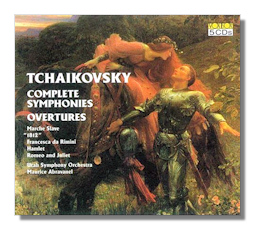
The Internet's Premier Classical Music Source
Related Links
- Tchaikovsky Reviews
- Latest Reviews
- More Reviews
-
By Composer
-
Collections
DVD & Blu-ray
Books
Concert Reviews
Articles/Interviews
Software
Audio
Search Amazon
Recommended Links
Site News
 CD Review
CD Review
Piotr Ilyitch Tchaikovsky

- Symphony #1 in G minor "Winter Daydreams", Op. 13 (1874)
- Symphony #2 in C minor "Little Russian", Op. 17 (1872)
- Symphony #3 in D Major "Polish", Op. 29 (1875)
- Symphony #4 in F minor, Op. 36 (1878)
- Symphony #5 in E minor, Op. 64 (1888)
- Symphony #6 in B minor "Pathétique", Op. 74 (1893)
- Symphony in B minor "Manfred", Op. 58 (1884)
- Symphonic Fantasy "Francesca Da Rimini" in E minor, Op. 32 (1876)
- Fantasy Overture in B minor "Roméo & Juliet" (1869)
- Marche Slav in B Flat Major, Op. 31 (1876)
- Overture solennelle "1812" in E Flat Major, Op. 49 (1880)
Utah Symphony Orchestra/Maurice Abravanel
Vox Box CD5X3603
I've written sporadically about the Utah Symphony Orchestra under Abravanel over the few years I've worked with Classical Net, and my impressions are almost always positive. There's a very solid Brahms cycle from these forces that I grew up with, and some decent Sibelius. Abravanel's Mahler is a mixed bag, and it's not shocking that the Fourth goes very well. More surprising is how terrific some of the larger works are, like the Second, Seventh, and Eighth. This set of Tchaikovsky is very good, too. In all of the above listed sets, the conducting of Maurice Abravanel is a clear strength. So it remains here. Any problems rest with the orchestra, which lacks the polish of almost anyone recording these works around the same time period (1970s). In Tchaikovsky, this is an issue with the soaring melodies that the composer's reputation rests on.
When writing about the Concertgebouw on Decca in this music, I noted that any loss of excitement in this "beauty first" approach was more than compensated by the gorgeous playing of the Dutch orchestra. Here, the reverse is true. Abravanel gives more shape and focus to the early symphonies than most, and his approach to the late works is never less than distinctive. If anything, he's more interesting than Haitink, bringing out details that his younger contemporary doesn't bother with. However, there is no comparison between the orchestras. The weakness of the Utah players is constantly exposed, and the sound is sometimes even ugly. The recordings themselves are very fine 70's stereo, though. In the tone poems, Abravanel faces even stiffer competition, and again tends to come up short.
Even with all that, this set is recommendable for a few key reasons. Firstly, whatever the technical deficiencies, the cycle is artistically consistent in a way that few conductors before or since have managed. Manfred is especially good, and this is a work that goes badly more often than not. Secondly, the set has always been extremely cheap, usually for less than 20 dollars. Should you not have interest in Ormandy's RCA mega-box devoted to this composer – and you ought to, but that's a different story – this fine disc set may fit the bill. As with much of what I review, older collectors may have particular interest. Younger listeners may be initially turned off by the rough sounds on display, but the commitment and musical intelligence is never in question. This might not be in print forever, so this 2001 release is something those who love these works should definitely investigate.
Copyright © 2016, Brian Wigman


















